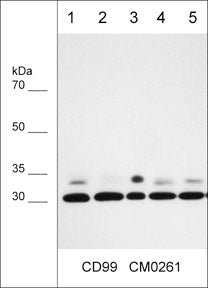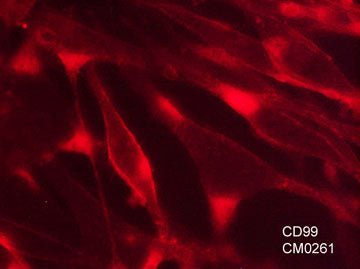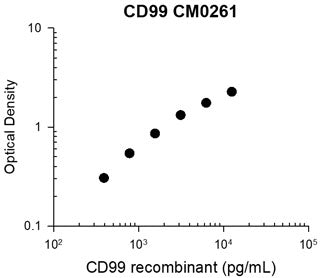Mouse Monoclonal
| ELISA (Cap) | 1:100 |
| ICC | 1:100 |
| IP | 1:100 |
| WB | 1:1000 |
Size 100 μl
Species Reactivity Hu, Rt, Ms
MW 30/32 kDa
Isotype IgG1
The glycosylated transmembrane protein CD99 is involved in many essential cellular functions including cell adhesion, migration, cell death, differentiation, and intracellular protein trafficking. The CD99 gene encodes two distinct proteins, type I is 32 kDa and type II is 28 kDa, which are a result of the alternative splicing of the cytoplasmic region. These CD99 isoforms are expressed in a cell-type-specific manner and may have distinct functions. CD99 is overexpressed in several types of sarcomas, lymphomas, gliomas, neuroendocrine tumors, and some breast cancers. In these tumors, CD99 may have oncogenetic functions that promote migration, invasion, and metastasis of tumor cells. However, other neoplasms, carcinomas, and sarcomas have CD99 expression in benign or early-stage tumors, but lower expression in the advanced-stage counterparts. In these tumors, CD99 may have oncosuppressor signaling, and its re-expression can lead to the reversal of malignancy. Thus, CD99 is an important membrane protein involved in many aspects of cell migration and adhesion in normal and diseased cells.
References
Pasello M, et al. (2018) J Cell Commun Signal. 12(1):55.

Western blot analysis of human cell lysates: A549 (lane 1), A431 (lane 2), LNCaP (lane 3), MDA-MB-231 (lane 4) and MeWo (lane 5). The blot was probed with mouse monoclonal anti-CD99 (CM0261) at 1:1000.

Immunocytochemical labeling of CD99 in paraformaldehyde fixed human MeWo cells. The cells were labeled with mouse monoclonal anti-CD99 (clone M026). The antibody was detected using goat anti-mouse DyLight® 594.

Representative Standard Curve using mouse monoclonal anti-CD99 (CM0261) for ELISA capture of human recombinant CD99 extracellular region with His-tag. Capture was detected by using an anti-His-tag antibody followed by appropriate secondary antibody conjugated to HRP.
*For more information, see UniProt Accession P14209
The products are are safely shipped at ambient temperature for both domestic and international shipments. Each product is guaranteed to match the specifications as indicated on the corresponding technical data sheet. Please store at -20C upon arrival for long term storage.
*All molecular weights (MW) are confirmed by comparison to Bio-Rad Rainbow Markers and to western blot mobilities of known proteins with similar MW.
This kit contains:




